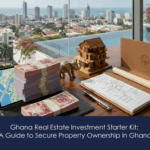
For many Ghanaians living abroad, investing in property back home is more than a financial goal—it’s a powerful way to reconnect with their heritage and build a lasting legacy. While the opportunity is immense, navigating the market from afar can be daunting. This guide serves as your comprehensive beginner’s property investment package, breaking down everything you need to know to invest securely and successfully in Ghana’s dynamic real estate sector.
Why Invest in Ghana? Understanding the Opportunity
Ghana is increasingly recognised as a beacon of economic stability and growth in West Africa, creating a fertile ground for real estate investment. The appeal is driven by several key factors:
- Strong Economic Drivers: A thriving economy and a growing middle class are fueling demand for housing, leading to significant potential for capital appreciation and wealth generation.
- Consistent Rental Income: Urban centres like Accra boast high occupancy rates, especially in desirable neighbourhoods like Airport Residential, Cantonments, and East Legon. This offers investors a steady stream of rental income to build financial security and hedge against inflation.
- Modern Market Trends: The real estate landscape is evolving. Tech-driven platforms with virtual tours and online listings are making remote investing more transparent and efficient. Furthermore, the rise of gated communities and sustainable developments addresses common investor concerns head-on. These professional developers often provide verified land titles, security, and reliable utilities (backup power and water), offering a de-risked, premium investment pathway.
Spotlight: Manora by Quao Realty – Invest Near Kotoka Airport
Located just minutes from Accra’s main airport, Manora Residence offers sleek studio to penthouse units starting at $94,000.
Enjoy modern amenities, stylish finishes, and a pool—all within one of the city’s most sought-after addresses.
You can visit the site and download the brochure, and start your journey.
The Core Challenge: Navigating Ghana’s Land System
A deep understanding of Ghana’s land tenure system is the most critical component of a successful investment. The country operates on a complex dual system that is the source of many potential risks.
Customary vs. Statutory Land Ownership
Ghana’s land is governed by two parallel systems:
- Customary Tenure: Accounting for about 78% of all land, this system is controlled by traditional authorities like stools, skins, or family heads. Rights are often based on unwritten traditions, making them difficult to register formally and creating a high potential for disputes and conflicting claims.
- Statutory Tenure: Governed by state laws and managed by agencies like the Lands Commission, this system provides a formal framework for transactions. While legislation like the Land Act, 2020, aims to modernise and digitise records, bureaucracy can still cause delays.
This fragmented system is a major reason why an estimated 57% of all court cases in Ghana are land-related. For an investor, this highlights the absolute necessity of professional legal due diligence to avoid protracted and costly legal battles.
Ownership Rights for Diaspora and Foreigners
- Ghanaian Citizens Abroad: You have the same ownership rights as residents. The highest right you can formally register is a 99-year leasehold.
- Non-Citizens: Foreign investors are limited to a maximum 50-year leasehold, often acquired through a locally established company.
Protecting Your Capital: A Due Diligence Blueprint
The Ghanaian real estate market has been called the “Wild West,” but this simply means that a strategic, professional approach is required to mitigate risk. Your physical absence is your biggest vulnerability, but a methodical due diligence plan turns it into a strength.
Common Risks and How to Avoid Them
Investors must be wary of common scams like fictitious real estate agencies advertising non-existent properties and fraudulent sellers offering the same plot to multiple buyers. Another significant threat is “land guardism,” where illegal groups use intimidation to extort money from legitimate landowners. Perhaps the most common pitfall, however, is the “Trust Gap”—relying on family or friends to manage the purchase, which often leads to mismanagement of funds or fraudulent deals.
The solution is to replace informal trust with a professional, accountable framework. The following checklist outlines key red flags and the professional actions required to counter them.
| Red Flag / Challenge | Due Diligence Action |
| Missing or Incomplete Title Documents Scammers often use fake or incomplete paperwork. | Action: Always demand the original title deed and hire a lawyer to conduct an official title search at the Lands Commission. |
| Unrealistically Low Prices Bait used to lure buyers into fraudulent or problematic transactions. | Vague or Verbal Commitments. Phrases like “the title is coming” are used to pressure payments. |
| Pressure to Pay Before Verification Legitimate sellers respect the need for due diligence. | Action: Never send money based on urgency or photos alone. All payments should follow a formal offer letter structured by your lawyer. |
| Relying on Family or Friends A common vulnerability leading to mismanaged funds or scams. | Action: Replace informal networks with vetted professionals, including a licensed real estate lawyer and a reputable developer or agent. |
| Relying on Family or Friends: A common vulnerability leading to mismanaged funds or scams. | Action: Insist that all promises and timelines are documented in writing and reviewed by your legal counsel. |
Spotlight: Manora by Quao Realty – Invest Near Kotoka Airport
Located just minutes from Accra’s main airport, Manora Residence offers sleek studio to penthouse units starting at $94,000.
Enjoy modern amenities, stylish finishes, and a pool—all within one of the city’s most sought-after addresses.
You can visit the site and download the brochure, and start your journey.
Your Step-by-Step Investment Action Plan
A secure real estate journey follows a structured process. This blueprint translates risk mitigation principles into a clear, actionable plan.
- Phase 1: Strategic Planning
- Clarify Your Purpose: Is this for personal retirement, long-term rental income, or short-term resale? Your goal will determine the property type and location.
- Identify High-Value Locations: Research neighbourhoods that match your goals. Premium areas like Cantonments are great for diplomat rentals, while emerging centres like Aburi offer growth potential.
- Choose a Property Type: Apartments in managed gated communities offer built-in security and are ideal for remote investors. Land offers flexibility but carries a higher risk due to tenure complexities.
- Phase 2: Professional Engagement
- Hire a Reputable Real Estate Lawyer: This is your single most important step. Your lawyer acts as your trusted representative on the ground, conducting all legal due diligence and securing your interests.
- Vet the Developer or Agent: Go beyond online searches. Investigate their track record, inspect completed projects, and verify their membership in professional bodies like the Ghana Real Estate Developers Association (GREDA).
- Phase 3: The Transaction
- Secure Your Title: The land title registration process with the Lands Commission is your legal proof of ownership. Your lawyer and a licensed surveyor will manage this multi-step process.
- Negotiate a Secure Payment Plan: Avoid large upfront payments. Work with your lawyer to structure payments tied to documented construction milestones or use an escrow service to hold funds until all legal conditions are met.
Budgeting and Logistics: The Financial Framework
A successful investment requires a clear understanding of all associated costs, financing options, and long-term management logistics.
Financing and Transaction Costs
Several Ghanaian banks, including First National Bank and Absa Ghana, offer diaspora-focused mortgage products. While accessible, be sure to analyse the interest rates (which can be around 10.5% for dollar mortgages) and eligibility requirements. Beyond the property price, budget for the following transaction fees:
| Transaction Cost Type | Typical Rate (%) |
| Legal Fees | 3% – 10% of property value |
| Stamp Duty (Tax) | 0.25% – 1% of property value |
| Agent Commissions | 3% – 5% (per agent) |
| Capital Gains Tax (on resale profit) | 15% |
| Rental Income Tax (for non-residents) | 15% |
Long-Term Property Management
For an absentee owner, hiring a professional property management firm is essential. These firms handle everything from finding tenants and collecting rent to managing maintenance, ensuring your asset remains profitable and well-cared-for. This professional service closes the “Trust Gap” and provides complete peace of mind.
Conclusion: Building Your Legacy with Confidence
Investing in Ghanaian real estate is an achievable dream filled with opportunity. Success, however, is not a matter of luck; it is the direct result of replacing informal trust with a strategic and professional approach. The market is maturing, with reputable developers and service providers offering the secure pathways needed for remote investment. By following this new investor real estate guide, you can confidently navigate the market, mitigate risks, and turn your vision of owning a piece of Ghana into a secure and successful reality.


